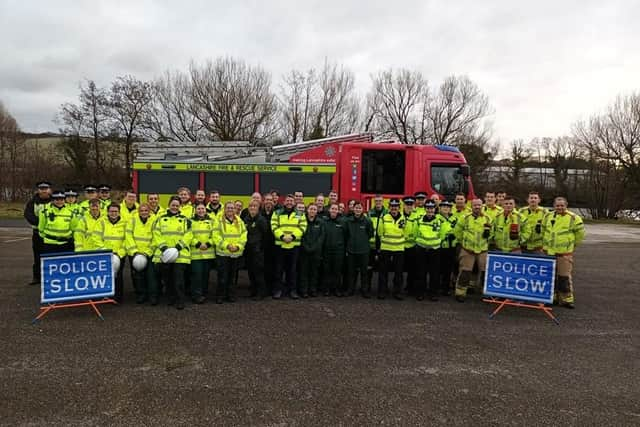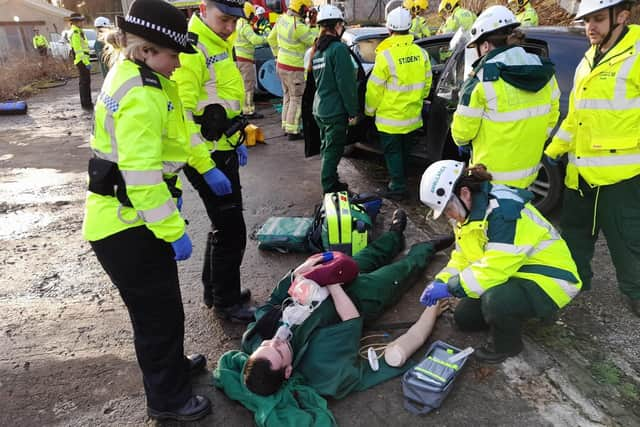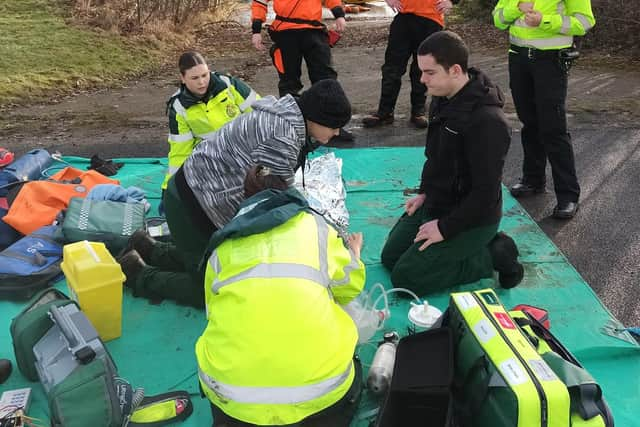'Fledgling' paramedics get their wings from Lancaster training camp 'stress test' ahead of graduation
and live on Freeview channel 276
Named ‘Green Fledgling’, alluding to the iconic colour of paramedic uniforms and the students’ level of experience, the exercise was designed to ‘stress test’ the skills and knowledge of third year paramedic students ahead of graduation this summer.
Cumbria Constabulary and Lancashire Fire and Rescue Service also participated, to test students’ clinical abilities and also to strengthen their team and partnership working skills.
Advertisement
Hide AdAdvertisement
Hide AdThe Army supported the exercise by providing use of Halton Training Camp, enhancing the realism of the scenarios.


Senior Lecturer in Paramedic Practice, Darren Moss, said: “The aim of the exercise was to collectively challenge our soon-to-be-qualified paramedics to demonstrate their leadership, clinical decision-making, patient assessment, and management skills while working together with the student police officers and the fire service.
“This is the first time we have put our third year student paramedics through such a gruelling series of simulations, and we have done it to prepare them for the future. We are very grateful for the support from Cumbria Constabulary and Lancashire Fire and Rescue Service. Their involvement really enhanced the authenticity of the day.”
Cumbria Constabulary sent their latest cohort of trainee police constables and Lancashire Fire and Rescue sent two full crews including a specialist fast-flowing water rescue team to assist with proceedings.
Advertisement
Hide AdAdvertisement
Hide AdThe exercise involved five ‘scenarios’ with the students tested on progressively complex kinds of resuscitation.


Simulations ranged from an assaulted pregnant patient with a sudden and unexpected birth, to a near drowning and a gunshot wound.
The finale involved the simulation of a five-vehicle road traffic accident with 10 patients displaying traumatic injuries.
Like in a real-life accident, the student police officers attended first, followed by paramedics and the fire service, who aided the extraction of casualties from the vehicles.
Advertisement
Hide AdAdvertisement
Hide AdCumbria Constabulary’s police constables were only a few weeks into their twenty-two-week training programme and attending gave the new recruits a taste of how police respond to such incidents.


PC Sam Butler, of Cumbria Constabulary’s training team, said: “We’d like to thank the university for organising this event. Our student officers got a lot out of this, providing them with some good experience of what they might encounter in emergency scenarios.
“They were also able to gain extra insight into how other agencies work and the event challenged them to work effectively as a team and communicate with partners for the good of the public.”
Lancashire Fire and Rescue Service participated in the exercise on the proviso that if a real emergency was called in, they would abandon the exercise to attend.
Advertisement
Hide AdAdvertisement
Hide AdLancaster station manager Matt Armstrong said: “We are grateful to the University of Cumbria for putting on a first-class exercise which allowed our staff the opportunity to take part in a realistic scenario whilst providing experience to the student paramedics.
"The training allowed us to work in close conjunction with the police and paramedics. This will further develop our close relationships to help strengthen our response to incidents in the future.”